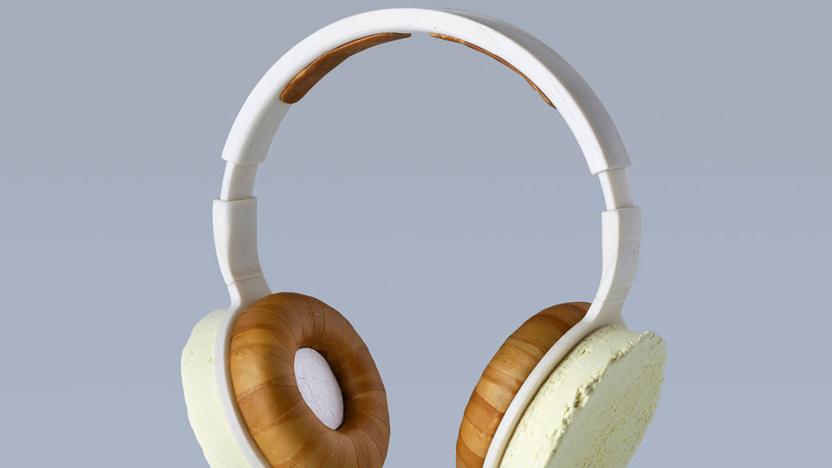yeast
Latest

Fungus headphones offer a glimpse at the renewable future of electronics
It turns out headphones are the perfect product to showcase the potential for growing electronics. The typical set has a mix of plastic, leather and mesh -- not the most environmentally friendly ingredients. To prove that we could swap those out for yeast, mushrooms and other microbe-grown materials, Finish design studio Aivan created headphones made from bioplastics and microbe derivatives.

Researchers genetically modify yeast to ‘brew’ THC and CBD
Scientists in California have created a cheaper, safer, environmentally-friendly way to produce cannabinoids, the chemical compounds that give cannabis its many medicinal (and mind-altering) qualities. The trick is in using genetically modified brewer's yeast to produce cannabinoids, rather than ethanol, according to research published today by the University of California, Berkeley.

Yeast could hold the key to custom-built DNA
Scientists have been playing with DNA for a long time, but now researchers are taking things a step further by building DNA from scratch in a bid to conquer life's blueprint. An international team of 11 labs from four continents are working together to "rewrite" the yeast genome, a project which could reveal the hidden rules that govern the structure of all living things. The controversial work, headed up by New York University, aims to enable scientists to create custom-made DNA codes. These could then be placed into living cells, changing how they function and giving valuable insight into disease. Much further down the line, scientists may even be able to create entirely new organisms. The right adjustments could also make yeast create new, efficient biofuels.

Genetically modified yeast mops up heavy metal pollution
Environmental scientists dream of eliminating pollution with natural resources, but that's tricky when it comes to heavy metals. Plants won't work for cleaning polluted water, and only some of them grow large enough to absorb those toxic materials. Researchers may have a relatively simple answer to the problem, though: genetically engineered baker's yeast. Their modified organism uses a cell membrane 'anchor,' and peptides that bind with metals like cadmium, copper and nickel to absorb their ions. The result? The best yeast strains can mop up 80 percent of metal ions without nasty effects -- you'd just have to scoop up the yeast after a cleanup operation.

An artwork controlled by a colony of bacteria
The Tate Modern's Turbine Hall has always been a vacuous space. Five storys high, with 35,000 sq ft. of space for artworks, it's been home to some of the London museum's most memorable exhibitions. Its latest, by sheer spirit of invention, is no exception.

Gene editing can end disease and fight global famine
We're looking at the single greatest advancement in genetics since Mendelev started growing peas. CRISPR-Cas9 gene-modification technology is powerful enough to cure humanity's worst diseases, yet simple enough to be used by amateur biologists. You thought 3-D printers and the maker movement were going to change the world? Get ready for a new kind of tinkerer -- one that wields gene-snipping scissors.

Artificial Intelligence solves boring science experiments, makes interns obsolete
Researchers at Aberystwyth University in Wales have developed a robot that is being heralded as the first machine to have discovered new scientific knowledge independently of a human operator. Named Adam, the device has already identified the role of several genes in yeast cells, and has the ability to plan further experiments to test its own hypotheses. Ross King, from the university's computer science department, remarked that the robot is meant to take care of the tedious aspects of the scientific method, freeing up human scientists for "more advanced experiments." Across the pond at Cornell, researchers have developed a computer that can find established laws in the natural world -- without any prior scientific knowledge. According to PhysOrg, they've tested the AI on "simple mechanical systems" and plan on applying it to more complex problems in areas such as biology to cosmology where there are mountains of data to be poured through. It sure is nice to hear about robots doing something helpful for a change.[Thanks, bo3of]Read: Robo-scientist's first findingsRead: Being Isaac Newton: Computer derives natural laws from raw data

Video of the yeast-and-sugar powered generator in action: experience the power of boring
Remember that yeast-and-sugar-powered generator from Dr. Cedrick Ngalande of Malawi we spotted a while back? Ol' Ced's back with a video of the system in action -- and an explanation of how it works, to boot. Just as most of you guessed, the system is powered by the yeast / sugar mix giving off CO2, leading to a pressure imbalance which tips the center of gravity and causes motion. What most of you didn't guess, however, is how freaking slowly that would happen -- check out the video after the break, and then wake up and wipe the drool off your face, slick.[Via BoingBoing]

Better Together at Amazon: Marmite yeast extract and .Mac?
Amazon must be testing some new accessory recommendation algorithms, as they have really branched out on this one: Reg Hardware in the UK has a story about Amazon UK's engine recommending Marmite, a popular sandwich-topping yeast extract in England, with a .Mac subscription. While I don't recommend spreading any Marmite on your .Mac anytime soon, I can see a connection between these two (im)perfect strangers via a former Marmite ad campaign slogan: "you'll love it or hate it." Nutrition facts aside, that seems to describe .Mac in a nutshell these days.No word on how soon this dynamic combo is shipping, nor how long this offer will last; "act now!"




